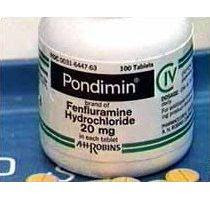Fenfluramine weight loss is another amphetamine used with little success for weight loss. As a weight loss medication it had only fair effect on weight but a host of undesirable side effects.
Medical intervention using a drug like fenfluramine weight loss may be necessary to individuals showing resistance to the conventional weight loss method.

Fenfluramine
Fat Burning Furnace (the easiest diet ever - see PROOF ) advices using weight loss drugs strictly on the morbidly obese. And even this as more of a last resort.
Fenfluramine and a related drug dexfenfluramine have since 1997 been pulled out of the markets in the U.S. They are probably unavailable as weight loss pills in most countries.
Dexfenfluramine is what is called an eutomer of fenfluramine. An eutomer is a mirror image of another chemical structure. This is similar to your left and right hand that are basically the same but structurally opposite (mirror image)
Both fenfluramine and dex-fenfluramine have been tried as solo drugs for treating obesity. However they grew in popularity when they were used in an "off-label" co-administration with phentermine weight loss another drug. The resulting cocktail, Phen-Fen and Dexfen-Phen resulted to a more effective weight loss drug, or so we thought.
As early as 1973, fenfluramine weight loss was being sold as a medication by the brand name Pondimin after approvals by FDA. It was also available in Europe in the early 1990’s before its famed rise as part of the "magic diet pill" phen-fen in 1996. It was marketed as Isomeride.
Isomeride was a non-addictive drug containing fenfluramine derivatives.
Later dexfenfluramine was approved for use in the U.S in 1996 and marketed as Redux, sparking of the phen-fen revolution.

Fenfluramine
Fenfluramine Weight Loss Mechanism of Action
Fenfluramine unlike other appetite suppressants release into the body extra amounts of serotonin. Serotonin is a neurotransmitter a brain chemical/messenger that is associated with satiety and a feeling also acted as a re-uptake inhibitor.
Neurotransmitters are brain chemical that carry messages within the brain. Since nerves do not physically connect to each other they send message across a synapses to the next cell using these chemicals. The message is picked up by the other nerve cell using receptors. Once the message has been passed the neurotransmitters are either destroyed or absorbed into the cell that produced them. This is done to stop the message.
The process of absorbing is called re-uptake. When re-uptake is inhibited, the effect of the neurotransmitter (the message) is amplified and also sustained. One of the effects of message of this neurotransmitter is a sense of fullness. Serotonin is one of these neurotransmitters.
This double effect of stimulating as well as inhibiting serotonin re-uptake is suggested to be the reason behind the more sever side effect of fenfluramine.

Fenfluramine
In the mid 1990’s fenfluramine was prescribed "off-label" with phentrmine. For a while the resulting cocktail phen-fen seemed like the panacea to the epidemic obesity of the west, until it was linked to serious heart valve disease and an often fatal Primary Pulmonary Hypertension (PPH).
Today, fenfluramine and dex-fenfluramine are not used in weight loss drugs. Their side effects are considered to adverse compared to their benefits. Both Fen and Dexfen have been linked to heart valve disease though to a lesser extent than their cocktail phen-fen.

No comments:
Post a Comment